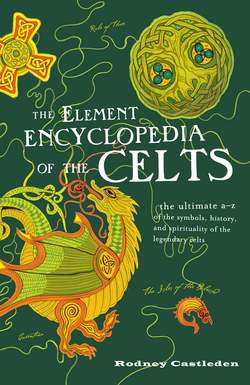Читать книгу The Element Encyclopedia of the Celts - Rodney Castleden - Страница 216
OSSIAN
ОглавлениеOssian was an ancient Gaelic bard invented by James Macpherson. The Poems of Ossian, also concocted by Macpherson, were published in the 1760s. They were an immediate sensation and Ossian acclaimed as a Celtic Homer.
During the next 30 years, the poems were widely read and translated into many languages. Goethe translated parts into German. Napoleon carried a copy with him on his march to Moscow. He also commissioned the artist Ingres to paint The Dream of Ossian.
The poems were extremely influential. They gave a huge impetus to the dawning Romantic movement. Poets as different from each other as Blake, Byron, and Elizabeth Barrett Browning were affected by them. The composers Mendelssohn, Schubert, and Brahms wrote music inspired by Ossian. The poems also stimulated the study of folklore and ancient Celtic languages.
When Macpherson first published his book, he claimed it was a translation of an ancient manuscript in Gaelic: a copy of an original work by Ossian. Several people challenged this, including Samuel Johnson, who said the poetry was the work of Macpherson himself, but Macpherson neither owned up nor produced the ancient manuscript. The controversy went on for many years.
Macpherson’s fake Celtic world was based on some authentic Celtic material. Fingal is based on Fionn Mac Cumhaill; Temora is Tara; Cuthulinn is Cú Chulainn; and Dar-Tula is Deirdre of the Sorrows. Parallels such as these create an air of authenticity, but most of the incident is Macpherson’s own invention.
One of the poems is Fingal. Macpherson presented his “translation” in continuous prose. Here I have broken it up into lines to make it easier to read. This is how Book 1 opens:
Cuthullin sat by Tura’s wall;
by the tree of the rustling sound.
His spear leaned against the rock.
His shield lay on the grass by his side.
Amid his thoughts of mighty Cairbar,
a hero slain by the chief in war;
the scout of ocean comes, Moran the son of Fithil!
“Arise,” said the youth, “Cuthullin, arise.
I see the ships of the north!
Many, chief of men, are the foe.
Many the heroes of the sea-borne Swaran!”
“Moran!’ replied the blue-eyed chief.
“Thou ever tremblest, son of Fithil!
Thy fears have increased the foe.
It is Fingal, king of deserts,
with aid to green Erin of streams.”
“I beheld their chief,” says Moran,
“tall as a glittering rock. His spear is a blasted pine.
His shield the rising moon! He sat on the shore!
like a cloud of mist on the silent hill!’
“Many, chief of heroes!” I said,
“many are our hands of war.
Well art thou named, the mighty man;
but many mighty men are seen from
Tura’s windy walls.”
He spoke, like a wave on a rock,
“Who in this land appears like me?
Heroes stand not in my presence:
they fall to earth from my hand.
Who can meet Swaran in fight?
Who but Fingal, king of Selma of storms?
Once we wrestled on Malmor;
our heels overturned the woods.
Rocks fell from their place;
rivulets, changing their course,
fled murmuring from our side.
Three days we renewed the strife;
heroes stood at a distance and trembled.
On the fourth, Fingal says, the king of the ocean fell,
but Swaran says he stood!
Let dark Cuthullin yield to him,
that is strong as the storms of his land!
#x2019; “No!” the blue-eyed chief replied.
I never yield to mortal man!
Dark Cuthullin shall be great or dead!
Go, son of Fithil, take my spear.
Strike the sounding shield of Semo.
It hangs at Tura’s rustling gale.
The sound of peace is not its voice!
My heroes shall hear and obey.’
He went. He struck the bossy shield.
The hills, the rocks reply.
The sound spreads along the wood:
deer start by the lake of roes.
Curach leaps from the sounding rock!
and Connal of the bloody spear!
Crugal’s breast of snow beats high.
The son of Favi leaves the dark-brown hind.
“It is the shield of war,” said Ronnart;
“the spear of Cuthullin,” said Lugar!
Son of the sea, put on thy arms!
Calmar, lift thy sounding steel!
Puno! dreadful hero, arise!
Cairbar, from thy red tree of Cromla!
Bend thy knee, O Eth!
descend from the streams of Lena.
Caolt, stretch thy side as thou movest along
the whistling heath of Mora:
thy side that is white as the foam of
the troubled sea,
when the dark winds pour it on
rocky Cuthon.
Now I behold the chiefs,
in the pride of their former deeds!
Their souls are kindled at the battles of old;
at the actions of other times.
Their eyes are flames of fire.
They roll in search of the foes of the land.
Their mighty hands are on their swords.
Lightning pours from their sides of steel.
They come like streams from the mountains;
each rushes roaring from the hill.
Bright are the chiefs of battle,
in the armour of their fathers.
Gloomy and dark, their heroes follow
like the gathering of the rainy clouds
behind the red meteors of heaven.
The sounds of crashing arms ascend.
The grey dogs howl between.
Unequal bursts the song of battle.
Rocking Cromla echoes round.
On Lena’s dusky heath they stand,
like mist that shades the hills of autumn;
when broken and dark it settles high,
and lifts its head to heaven.
